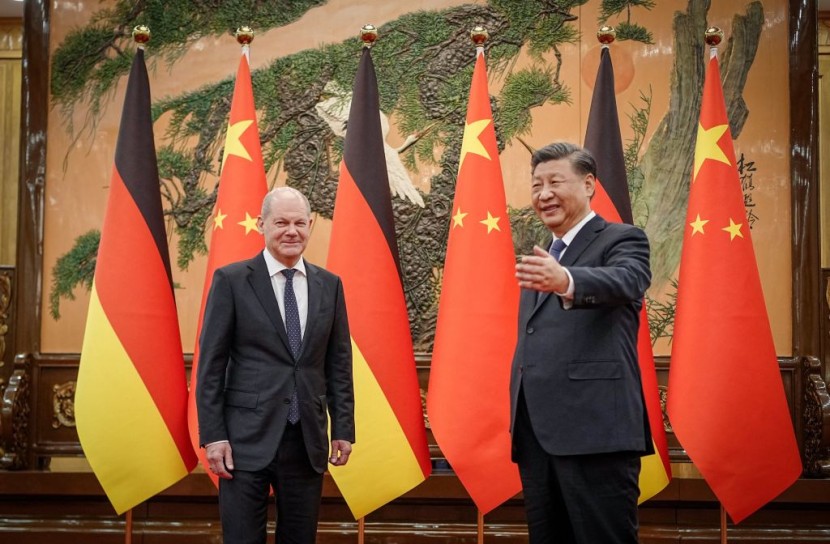
Chinese President Xi Jinping urged for peace talks between Russia and Ukraine in a Friday meeting with German Chancellor Olaf Scholz. He also cautioned against the deployment of nuclear weapons in the ongoing war.
Critics have pointed to China's tacit support for Russia, ongoing conflicts over economic connections, and human rights issues as reasons to discount the German leader's one-day visit to the Chinese capital. It follows a massive Communist Party congress last month, where Xi further solidified his autocratic control, according to The Washington Post.
Scholz's visit highlights Germany's car and manufacturing trade connections with China, the world's second-largest economy.
Chinese news organization CCTV cited Xi as saying the world situation is "complex and changeable." The world would benefit from greater contributions to peace and development from both China and Germany, two nations that are influential enough to work together in times of transition and chaos.
To address the situation in Ukraine, Xi "pointed out that China supports Germany and the EU in playing a significant role in advancing peace talks and promoting the establishment of a reasonable, efficient, and stable European security policy," as reported by CCTV.
Xi Jinping has called for a concerted international opposition to the use or threat of use of nuclear weapons and the creation of conditions for the restart of discussions.
Russian President Vladimir Putin restated Moscow's unfounded claim that Ukraine is organizing a false-flag strike with a toxic dirty bomb to blame on Russia.
Peace Talks Must Resume ASAP
AP News reports, regarding the Ukraine war, Xi pointed out that China supports Germany and the EU in playing an important role in promoting peace talks and promoting a balanced, effective, and sustainable European security framework.
Xi stated the international community should "urge on all sides to display "rationality and restraint," make close communication "as soon as possible" and establish grounds for the restart of dialogue.
Russian President Vladimir Putin has repeated Moscow's unfounded claims that Ukraine is planning a false-flag strike with a radioactive dirty bomb that it would try to place on Russia, but he has shown no proof to support this claim.
China has consistently voiced resistance to what it regards as unlawful sanctions on Russia, refusing to either denounce the Russian invasion of Ukraine.
The growing conflict in Ukraine has made it awkward for China to maintain its relationship with Russia, which was enhanced when President Vladimir Putin attended the Winter Olympics opening ceremony in Beijing on the same day that the two nations announced a strategic cooperation with "no limits."
Read Also : North Korea Continues Weapons Tests, Fires Intercontinental Ballistic Missile That 'Disappeared'
Building Stronger Ties Past COVID-19 Pandemic
Olaf Scholz is the first G7 leader to meet with Xi since the COVID-19 pandemic began in China in 2019 and the first European leader to visit China since Russia's invasion of Ukraine, which Germany fiercely criticized.
The diplomatically fraught trip comes as Germany and the EU formulate a strategy for an increasingly assertive and authoritarian Beijing.
Beijing's repeated calls for peace talks and its refusal to back measures at the UN condemning Russia's invasion have provided Moscow with diplomatic cover.
In addition, China has harshly attacked the United States and NATO for imposing economic penalties on Russia and has accused them of instigating the attack.
On Friday, German Chancellor Olaf Scholz reportedly asked Russian President Vladimir Putin to extend an agreement permitting the safe passage of grain shipments from Ukraine to avert a famine catastrophe, as reported by France 24.
"I urge the Russian president not to refuse to extend the grain agreement, which ends in a few days," he told reporters on a visit to Beijing. The use of hunger as a threat or weapon is unacceptable," the German leader Olaf Scholz remarked.
Scholz has been criticized for visiting China so soon after Xi's win at last month's congress, where he was elected to a third five-year term and packed the all-powerful Politburo Standing Committee with loyalists who embrace his agenda of strict restrictions over society and the economy and a more hostile stance to the West.
German Chancellor Olaf Scholz is joined on the tour by the CEOs of several successful German companies operating in China. These include Volkswagen, BMW, BASF, Bayer, and Deutsche Bank, to name a few. During his time in Beijing, Scholz will also meet with company representatives.
Related Article : Bank of England Warns of Historic Recession But Still Imposes Largest Rate Increase in 33 Years
© 2026 HNGN, All rights reserved. Do not reproduce without permission.







